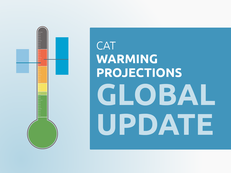Publications
Comparison between Climate Action Tracker and Climate Interactive assessments
The Climate Action Tracker estimates a “best-guess” (median) global warming by 2100 of 2.7°C above pre-industrial, based on its assessment of pledges and policies in INDCs from 1 October 2015, with likely (>66%) chance of warming below 3°C. Climate Interactive estimates a best guess, median warming level of 3.5°C, significantly read more...
G20 - all INDCs in, but large Gap remains
The 2015 G20 Summit, (Turkey, 15-16 November) will see Heads of State and Government meet to discuss, among other issues, development, energy and climate change finance.All G20 members have presented their “intended nationally determined contributions” or INDCs, to the UNFCCC for the Paris Agreement. The Climate Action Tracker (CAT) has read more...
INDCs lower projected warming to 2.7°C: significant progress but still above 2°C
On UN deadline, Government climate pledges, if implemented, would warm world by 2.7°CThe combination of Government climate action plans, if implemented, would bring global warming down to 2.7°C, according to an analysis released today by the Climate Action Tracker (CAT).On the day of the October 1 UN deadline for governments read more...
The CAT emissions gap – How close are INDCs to 2 and 1.5°C pathways?
Government climate action would see warming well beyond 2°C – analysisThe climate targets so far submitted to the UN by governments collectively lead to global emissions far above the levels needed to hold warming to below 2°C, the Climate Action Tracker said today.The analysis by the consortium of four research read more...
Australia set to overshoot its 2030 target by large margin
Without further policies, Australia’s emissions are set to increase substantially - around 27% above 2005 levels by 2030, according to an assessment by an international research analysis, the Climate Action Tracker (CAT).As its contribution towards the Paris Climate Agreement, Australia has put forward an emissions reduction target of 26-28% below read more...
Will an in increase in share of renewable power in Brazil and United States be enough to curb emissions to levels consistent with necessary reductions in the countries?
The 20% goal for renewables in the US and Brazilian power sectors is a step in the rightdirection. The main positive point is that it is an example of countries agreeing to worktogether on their way to low carbon economy. In both, Brazil and the United States long-termpolicies ensuring investment read more...
New Zealand deploys creative accounting to allow emissions to rise
New Zealand climate target “inadequate” and “far from doing its fair share” - international analysis.New Zealand is far from doing its “fair share” of climate action, with its climate plans, submitted this week to the UN, and rated as “inadequate” by an independent international analysis: the Climate Action Tracker.The Climate read more...
G7+EU INDCs: some improvement, but a large emissions gap remains
The combined climate plans for the G7 and EU have made a small step towards the right track to hold warming to 2?C, but there is still a substantial emissions gap, the Climate Action Tracker said today.Ahead of the upcoming G7 meeting in Germany, the Climate Action Tracker - an read more...
Are governments doing their “fair share”? - New method assesses climate action
Climate Action Tracker assesses government climate proposals on what’s “fair” and holds warming below 2?C.The Climate Action Tracker (CAT) has developed the most comprehensive method yet of simultaneously assessing the “fairness” and “below 2?C compatibility” of government climate action put forward for the Paris Agreement, expected to be adopted in read more...
EU could clarify forestry, land use accounting to strengthen its INDC
The European Union has submitted its “intended nationally determined contribution” (INDC) to a new international agreement on climate change.The EU target is to reduce domestic greenhouse gas emissions by at least 40% below 1990 in 2030. However, it includes forestry accounting, which could effectively weaken the reductions necessary by all read more...
Stay informed
Subscribe to our newsletter

